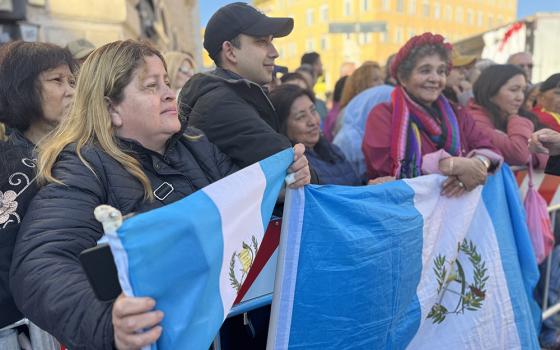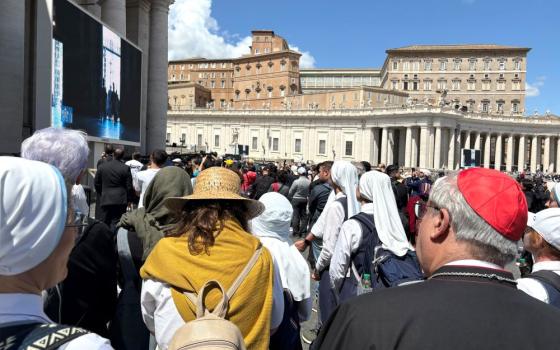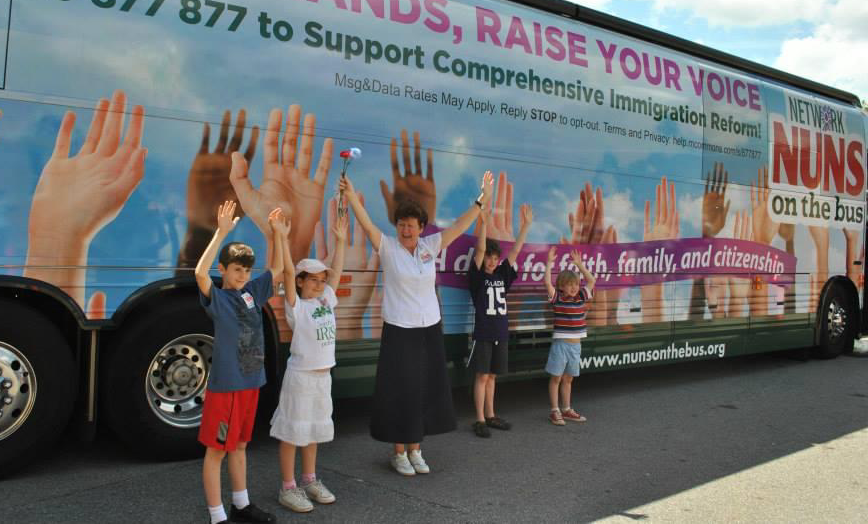
Sr. Mary Ellen Lacy stands outside Network's bus during the 2013 Nuns on the Bus tour for immigration reform. Lacy started her career as a nurse and later joined the Daughters of Charity. She is now an immigration lawyer. (Courtesy of Mary Ellen Lacy)
When Sr. Mary Ellen Lacy met the Daughters of Charity at age 42, she had already lived many lives. Born to a large Irish Catholic family on the south side of Chicago, she began her career as a nurse ("the most awesome profession ever," she says). But by the time she turned 26, she was getting "itchy," wondering what could be next.
So, while working full time at Christ Hospital in Oak Lawn, Illinois, she studied law at John Marshall Law School (now part of the University of Illinois Chicago School of Law). Upon graduating in 1991, she took a position in risk management in a medical malpractice insurance firm in Chicago, which eventually led her to working not only with hospitals and outpatient clinics but also with nursing homes.
After working closely with the administrators of these facilities, she was inspired to transition once again to a new role in health care: nursing home administrator. But, after the nursing home closed to combine with another facility, she had a choice to make.
"I'd often thought about being a sister," she said, "and now every excuse was falling away."
An internet search led her to a list of religious orders with specialties in health care and service to the poor. But it was a friend and former priest's connection to a Daughter of Charity — also Irish Catholic, and "very persuasive" — that convinced her to meet with the order.. In addition to poverty, chastity and obedience, the Daughters of Charity — a Vincentian order — take a fourth vow of service to the poor. With that, Lacy said, "something clicked."
A Daughter of Charity with a law degree was not a common combination for an order with a rich history of health care, social work and education. After completing seminary in Evansville, Indiana, in 2008, she was sent to El Paso, Texas, to study asylum law in order to assist the migrant and refugee communities the Daughters serve.
Then she was sent to Alabama, where she found herself advocating for Vietnamese immigrant families in Bayou La Batre, whose livelihoods as crabbers, shuckers and pickers had been destroyed by the 2010 Deepwater Horizon BP oil spill and were being preyed upon by unscrupulous law firms.
In 2011, she was sent to Washington, D.C., where she joined Social Service Sr. Simone Campbell's staff at Network to lobby for the rights of the poor and marginalized, including immigrants and refugees.
At Network, Lacy became part of the team that responded to the Vatican's 2012 censure of the Leadership Conference of Women Religious by creating the "Nuns on the Bus" movement. The program redirected widespread media attention from the censure toward defending social programs that were at risk under then-Rep. Paul Ryan's proposed budget.
Nuns on the Bus, of course, became a smashing success. Lacy went on three more tours around the country over the next several years, speaking with voters and legislators alike on the necessity of voting for the best interests of the most vulnerable.
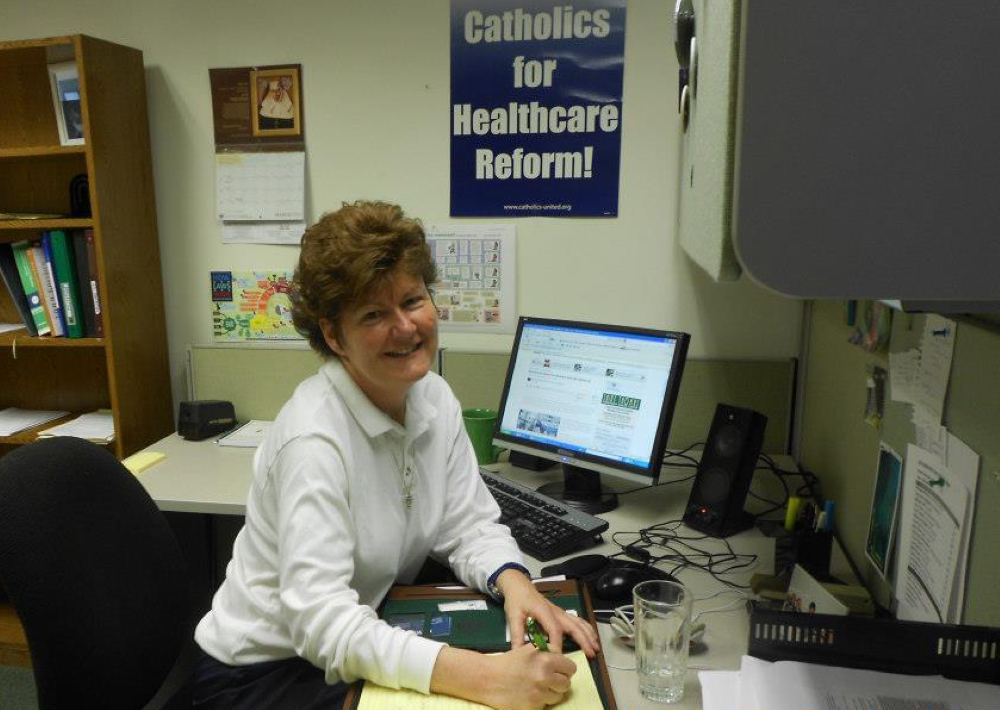
Daughter of Charity Sr. Mary Ellen Lacy sits in her cubicle at Network in 2012. At Network, Lacy helped create the "Nuns on the Bus" movement. (Courtesy of Mary Ellen Lacy)
"It was just beautiful," she said, "having seen the suffering firsthand from these terrible laws and systems and to be able to get a chance to tell the people who are writing these laws, 'You don't understand the implications of this, and you need to do something different.' "
After D.C., Lacy continued her work in law and social justice in several other cities before returning to her hometown of Chicago in 2019, just before the COVID-19 pandemic hit. And that is where Lacy is now, having set up her own firm as a family and humanitarian immigration lawyer in the administration building of San Jose Sanchez del Rio-Maternidad BMV parish in Humboldt Park.
"I try to find relief for those who don't have documents, to meet with the person and try to figure out if they have a shot at a green card," she said. "If they don't, there are other options. … At least half [the people who come to me] have no idea and just come to say, 'Help.' "
Like other sanctuary cities, Chicago has received unprecedented numbers of migrants, refugees and asylum-seekers as governors like Ron DeSantis of Florida and Greg Abbott of Texas — both Catholic — send busloads of people northward from the border. Lacy's clients include recent arrivals and people who have lived in the U.S. more than 20 years. She accompanies them through the long, complex, emotional process of obtaining documents, filing for asylum, or just getting a court date. Some cannot return to their home countries without risking death. One client, a young woman from Venezuela who fled after witnessing a violent police crime, has been threatened with rape and murder if she ever returns. Others are trying to rejoin their families or escape economic desperation.
The sheer number of people coming in great need, crossing some of the most dangerous tracts of land on Earth — and the vicious anti-immigrant rhetoric that greets them if they survive — is enough to make even the stalwart Lacy pause.
"How do we get the country to stop politicizing a crisis of humanity?" she asked. "When you make everything political, you don't let it break your heart. It's easy to not see these people as human beings and see our own role in it. We need to look at the causes and go in there and help them, humbly. Because we caused a lot of that."
From nursing to Network, administration to asylum law, from the border to Capitol Hill, Lacy, now 61, has guided people through some of the most vulnerable moments of their lives: sickness, old age, poverty, seeking refuge, fearing for their safety, attempting to unite their families.
"My favorite quote in the Bible is Isaiah 6:8: 'Lord, send me.' If we mean that, that's what we've got to do," she said. "We've got to sit in the discomfort. People living in economic deprivation sit in that every day. So when we sit in that discomfort, wondering what he's calling us to do, I think the answer is just, 'Lord, send me. Wherever.'"
And then," she added, "be prepared for great things to happen."
Global Sisters Report: You were in "the room where it happened" when the idea of Nuns on the Bus took shape. Can you summarize what went into that decision and what your involvement was?
Lacy: It was so spirit driven. It was a perfect holy storm.
In April 2012, Network was celebrating its 40th anniversary, so we were busy thinking about how to get our name out there. And then at the same time, Rep. Paul Ryan put forth this budget that would block grant Medicaid, cut Pell grants, and stop a lot of programs for those people who suffer from poverty. At one point, he called it a budget consistent with Catholic values, so we were incensed by this. Nothing that harms the poor is consistent with our preferential option for the poor and Catholic social justice teaching. And as a lobbyist, we had to respond to that.
And then it was almost like the Vatican said, "Let us help you out." We received an eight-page critique of American Catholic nuns, where the Vatican was saying we spend too much time talking about social justice issues and issues of those who suffer from poverty; we don't spend enough time talking about abortion and same-sex marriage. And they pointed out Network specifically as being a bad influence for the sisters.
Within the next hour, it started blowing up: everybody is reading this, it's getting publicity, our phones are ringing. Simone [Campbell, then-executive director of Network] just didn't know what to do: She was hurt, she was angry, we were publicly ridiculed by our own church. But I think it just shows the most tremendous wisdom and humility: Simone knew we needed to respond, but in all humility she said, "I don't know how."
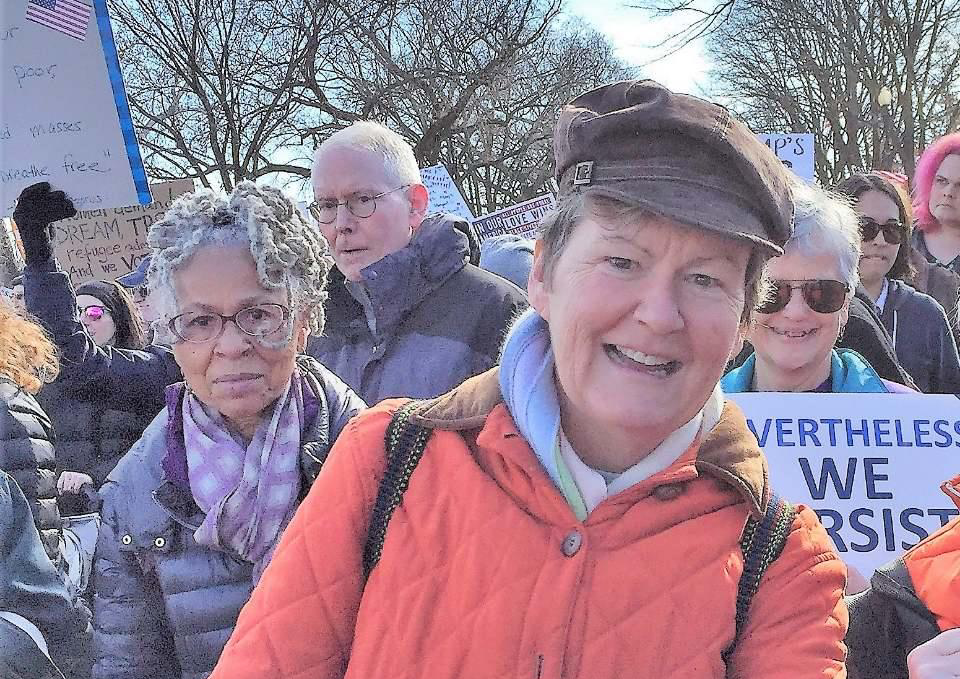
Sr. Mary Ellen Lacy, who practices immigration law, participates in a march in Washington, D.C. "We are our brothers' and sisters' keepers," she says. (Courtesy of Mary Ellen Lacy)
She decided to call in our friends to come together. [The question became:] How do we use this newfound notoriety? What we do is we serve the poor by improving systems. How do we do that, and how can we use it to amplify our opinions of Paul Ryan's budget? So people were talking and said, "How about a whistle stop tour like Truman?" And somebody joked and said, "Well they're nuns, you can't put 'em on a train, you put 'em on a school bus."
So it was decided, "Let's put them in the face of the voters: 'Here we are, and as long as you're here, let's talk about this budget, let's talk about these programs that are going to be cut for those who suffer from poverty, let's hold up the programs that nuns do and how nuns will be hurt if this budget is allowed.' "
We thought we were getting a school bus, or maybe a Greyhound with a toilet. Then this bus shows up and is like a rockstar bus wrapped with the words "Nuns on the Bus." We found out it had been Mary J. Blige's bus before us.
My job was finding places to spend the night. I just picked up that Catholic registry book and started calling Catholic convents and motherhouses. The route was very politically organized. We went to the places where legislators would be voting on this, where we could talk about the need for a decent budget that supported the rights of those who suffer from poverty.
The routine was we'd visit a program, visit the legislator, and in the evening we'd have what we called a "friendsraiser" — we would have people come and we would speak about the issue. The main message was, "We are our brothers' and sisters' keepers. We have to vote in a manner which holds up all of our brothers and sisters." Not just people who have money. We all do better when we all do better. That was the message. Vote their values, not their party, not their history.
What has been the impact of the Nuns on the Bus tours? Have they influenced the relationship between women religious and the American public?
I think the success of the tours was born from the recognition that the public held a fondness for the sisters who had taught them to be honest, do right, care about one another. When they thought the sisters were being attacked, they wanted to come to their aid. And when we discussed how much they wanted to get involved, we took it the next step: "We taught you as children, and now as adults, what you value needs to be voted upon."
These people had a hunger and a thirst to see a community care for one another, and they were willing to make sacrifices, and they had. People would come all the time and tell us what they were doing in their communities and how they were looking out for one another and how that was important to them and how they wanted their big government to care about the little person too. They did so much for their brothers and sisters suffering from poverty that it humbled us. I mean, we give our life to it; it's easier to be a sister and serve the poor than it is to have a family and work in the world and make time to serve others. They found time, they shared with us, they humbled us.
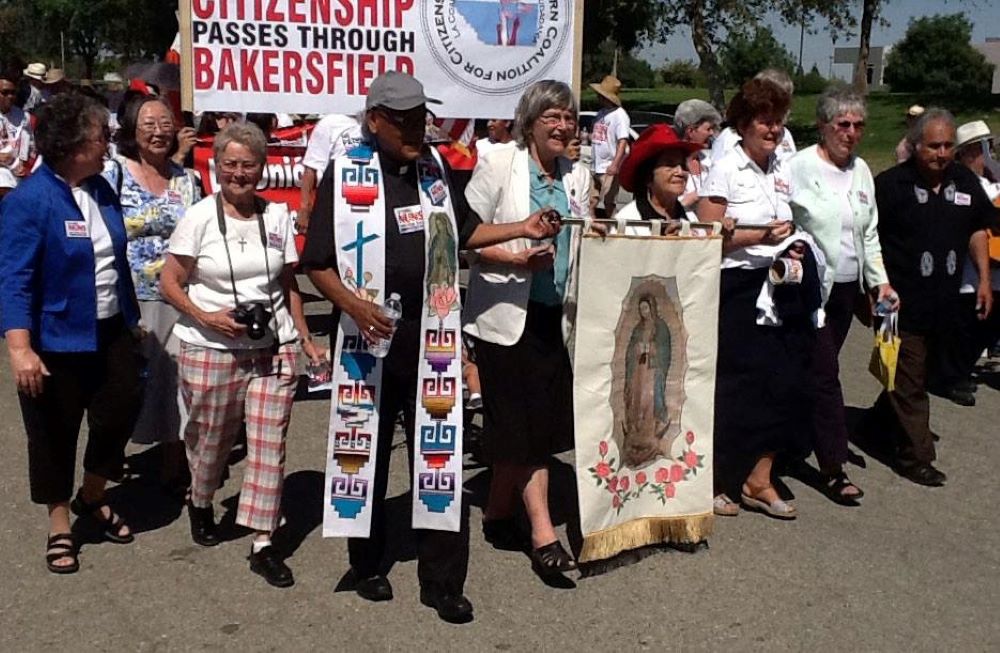
Sr. Mary Ellen Lacy marches alongside civil rights activist Dolores Huerta. "States that allow immigrants to live legally do better economically," says Lacy, an immigration lawyer. "The idea of welcoming people and making them legal helps us all." (Courtesy of Mary Ellen Lacy)
What does an immigration lawyer do for asylum-seekers and other migrants?
Immigration law is no different than family law or business law: What you do is dependent on the person in front of you. So the first time you meet a client, you're going to take a good intake, find out what their issue is. You as the lawyer then use your knowledge to see, "How can I make these people's lives better? What avenues are open to them?" My job is to decide if we file protected status, asylum or both. You give them the full array of options and the risks and the benefits associated with each one. Together we come up with a plan and then I file the paperwork and argue the case at the interview if I need to. That process can take years. TPS and asylum work quicker, but right now people are waiting three years just for their first court date.
The bigger part of what I do is family reunification. The way people come to America is you petition your family member in another country and they come. But our system is so messed up.
I have a client, and he and his wife have a petition that was approved in 2001. Jose and Maria have been here since 1999. He has been paying his taxes, working, having children, raising them here; he's a member of his church, a good member of his community, never been arrested, never caused problems. This is a model United States citizen, except that he's not. He doesn't have papers. He's waiting for this approved petition.
When people have to wait 23 years to see their family again — they're aging out. That's why people skip the line. Twenty-three years isn't a line; it's a lifetime. We're asking families to wait 20-plus years. People die. People lose papers. It's way too complicated. It's way too unfair.
We give less than half a million visas a year to families for reunification, and each country can only get 7% of the visas, so if you're Mexican, Indian, Chinese, you're waiting 20-something years because there's already a lot of Mexican and Chinese people here, and everyone's filing for their family. That's how the backlog starts. Until we come up with a system that approves the regular family, we're going to continue to get people who end up staying in other places until it's too long and they can't wait anymore.
Before becoming a Daughter of Charity, what was your understanding of the immigrant/refugee experience? How has that changed in your work both as a woman religious and as a lawyer?
I think the difference for me personally was before I was a Daughter I wanted to serve other people because it felt good to serve other people. But it was more like "being nice," doing the right thing, being charitable; because they're people, you should do good.
Then I became a Daughter of Charity. For me, the Vincentian spirituality is to see Jesus Christ in a person who suffers, and when you look at a person and see Jesus Christ, that's a game changer. Because it's no longer you doing charity like handing down a service. If you're looking at our Lord, you're handing up. You don't stand above our Lord.
And that's how service is done right. You recognize you're serving God, so you're reaching up, you're holding up, you're offering your meager gifts and hoping they take it. The final step in service to those who suffer from poverty is to take the next step and let them evangelize you, because that makes you a better servant.
In your experience, how do law and religious life complement each other? Is there ever any tension between the two?
(Laughing) They don't complement each other, trust me.
In my order there is predominantly social work, teaching, and health care; being a lawyer was pretty foreign. It's been a source of tension for me because we get moved around a lot, and if you're getting moved a lot when you're required to have a license, it is hard in the one sense to find a job. My council never missioned me with a legal position. I was missioned with an idea of the persons I should serve. So that was very difficult.
But in the other sense, because I wasn't locked into a firm, I was available in Bayou La Batre to help people get their cases back from those unscrupulous law firms. I was available to go on a bus around the country several times. I was available to open my own firm.
When you allow yourself to be open to something else, perhaps because you have nothing else, sometimes God takes from you so you'll be open to do what he's calling you to do. So while it was hard for me that I was usually without a set ministry when I was missioned, and while it may have caused some spiritual distress for me, it also enabled me to serve those who suffer from poverty like I never dreamed I would be able to serve. Instead of looking at "Poor me, why is God emptying me right now," ask "What is God opening me up for, and how will I respond?"
Advertisement
What do you wish the average Catholic would understand about the immigration crisis?
As Catholics, we believe everything is a blessing from God, everything is given to us. And we're right. Nobody earned their right to be a U.S. citizen. You were accidentally born here. You could have been born in Mexico or Honduras or Venezuela. And if your daughter, your granddaughter, was at the border asking for compassion, how would you respond? How would you want others to respond? We can't take the humanity away from these people by saying they're just numbers, or there's too many of them.
Ask yourself, "What have I really suffered so far by the admission of these people? What is my opposition?" Is it just more fear? Is it a sense of entitlement? I mean let's be real: We privileged people are here not because we earned it, but because we were gifted this place of birth without cost. And so we are called to give without cost.
States that allow immigrants to live legally do better economically. The idea of welcoming people and making them legal helps us all. It enriches us from a diversity perspective, it brings new talents, new skills. Everybody should have a right to have what we had an opportunity to have. And that's not saying that people don't have to play by the rules, but let's make a rule, and let's make a line — not just, "Let's file some paperwork and we'll see you in a quarter of a century."
We are our brothers' and sisters' keepers. And we have to own that responsibility. And to do that, you vote your values. You don't get to say on Sunday, "Oh yes, we love one another, we're here for each other, and God sacrificed everything for me," and then turn around and vote in a manner that harms people who don't have as much as you. Be the person in the polls that you are on Sunday.





